Organisational Behaviour Report: Waitrose's Culture and Performance
VerifiedAdded on 2020/12/18
|20
|5339
|469
Report
AI Summary
This report provides an in-depth analysis of organisational behaviour within Waitrose, a British supermarket chain. It examines the impact of organisational culture, power dynamics, and workplace politics on individual and team performance. The report delves into different types of organisational culture, including power, task, person, and role cultures, and their effects on employee behaviour. It also explores various motivation theories, such as Maslow's Hierarchy of Needs and Vroom's Expectancy Theory, to understand how to motivate employees to achieve their goals. Furthermore, the report discusses the characteristics of effective teams and contrasts them with ineffective teams, highlighting the importance of teamwork in achieving organisational objectives. Finally, it outlines the philosophies of organisational behaviour and their application within the Waitrose context, offering insights into how these principles shape the company's approach to management and employee relations.
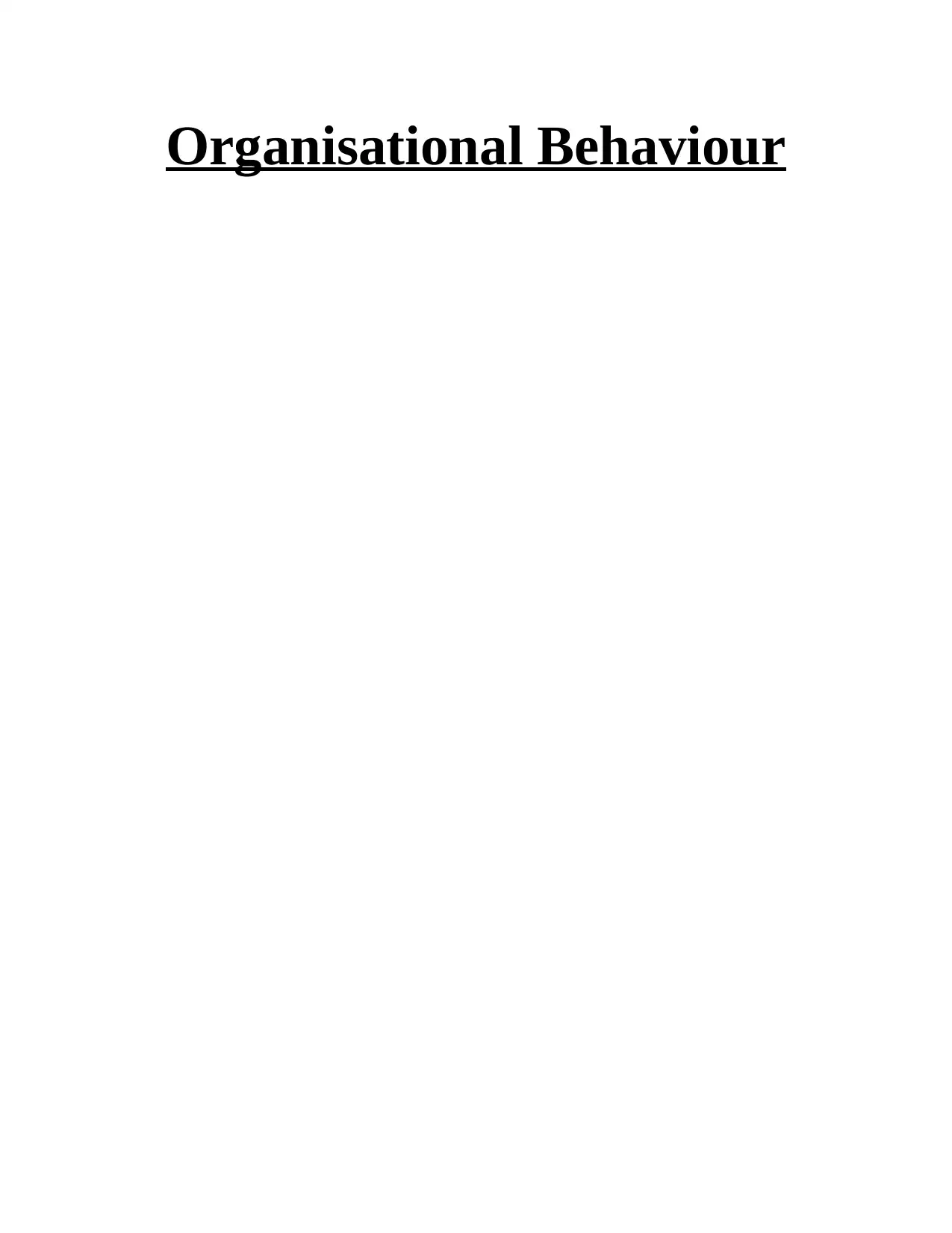
Organisational Behaviour
Paraphrase This Document
Need a fresh take? Get an instant paraphrase of this document with our AI Paraphraser
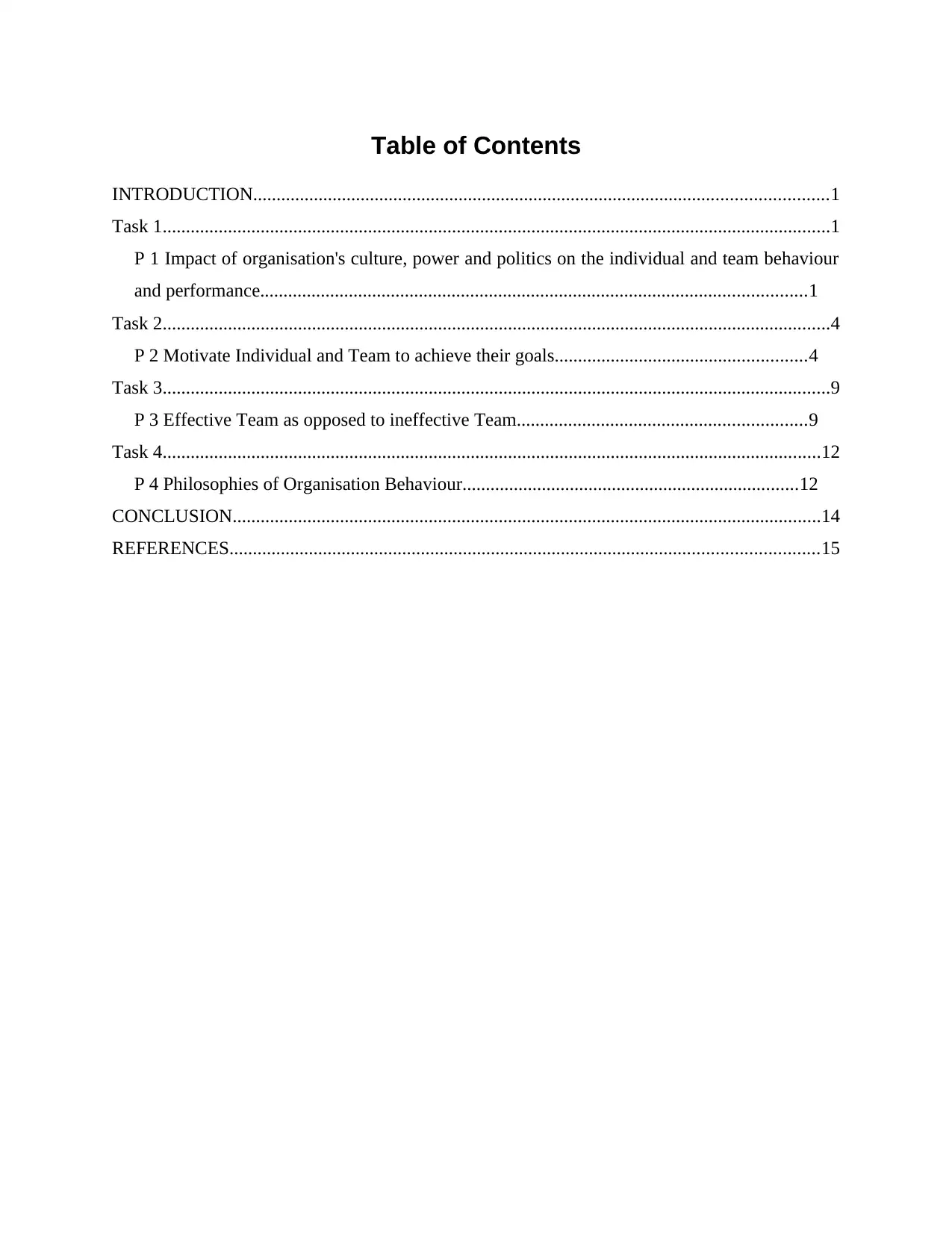
Table of Contents
INTRODUCTION...........................................................................................................................1
Task 1...............................................................................................................................................1
P 1 Impact of organisation's culture, power and politics on the individual and team behaviour
and performance.....................................................................................................................1
Task 2...............................................................................................................................................4
P 2 Motivate Individual and Team to achieve their goals......................................................4
Task 3...............................................................................................................................................9
P 3 Effective Team as opposed to ineffective Team..............................................................9
Task 4.............................................................................................................................................12
P 4 Philosophies of Organisation Behaviour........................................................................12
CONCLUSION..............................................................................................................................14
REFERENCES..............................................................................................................................15
INTRODUCTION...........................................................................................................................1
Task 1...............................................................................................................................................1
P 1 Impact of organisation's culture, power and politics on the individual and team behaviour
and performance.....................................................................................................................1
Task 2...............................................................................................................................................4
P 2 Motivate Individual and Team to achieve their goals......................................................4
Task 3...............................................................................................................................................9
P 3 Effective Team as opposed to ineffective Team..............................................................9
Task 4.............................................................................................................................................12
P 4 Philosophies of Organisation Behaviour........................................................................12
CONCLUSION..............................................................................................................................14
REFERENCES..............................................................................................................................15
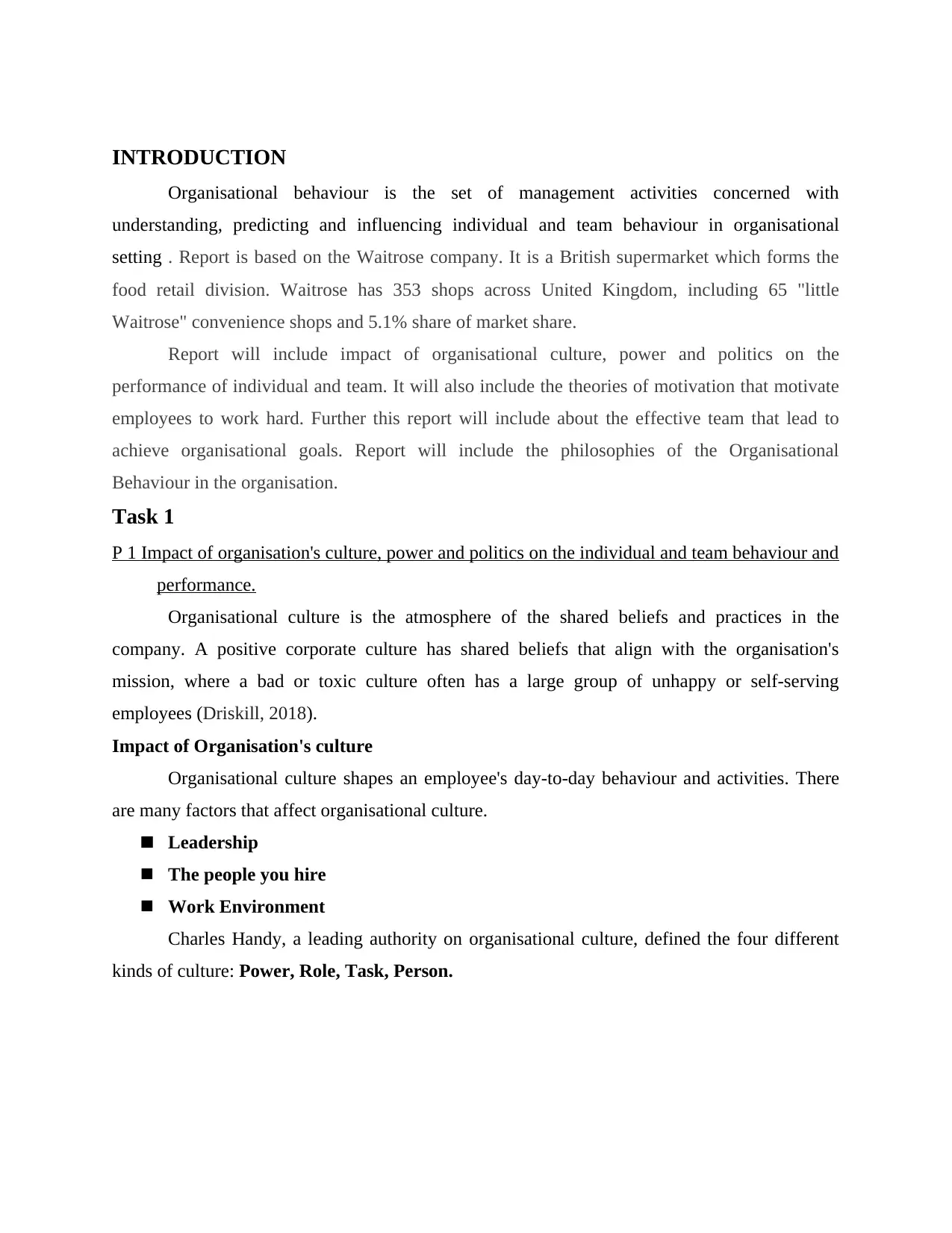
INTRODUCTION
Organisational behaviour is the set of management activities concerned with
understanding, predicting and influencing individual and team behaviour in organisational
setting . Report is based on the Waitrose company. It is a British supermarket which forms the
food retail division. Waitrose has 353 shops across United Kingdom, including 65 "little
Waitrose" convenience shops and 5.1% share of market share.
Report will include impact of organisational culture, power and politics on the
performance of individual and team. It will also include the theories of motivation that motivate
employees to work hard. Further this report will include about the effective team that lead to
achieve organisational goals. Report will include the philosophies of the Organisational
Behaviour in the organisation.
Task 1
P 1 Impact of organisation's culture, power and politics on the individual and team behaviour and
performance.
Organisational culture is the atmosphere of the shared beliefs and practices in the
company. A positive corporate culture has shared beliefs that align with the organisation's
mission, where a bad or toxic culture often has a large group of unhappy or self-serving
employees (Driskill, 2018).
Impact of Organisation's culture
Organisational culture shapes an employee's day-to-day behaviour and activities. There
are many factors that affect organisational culture.
Leadership
The people you hire
Work Environment
Charles Handy, a leading authority on organisational culture, defined the four different
kinds of culture: Power, Role, Task, Person.
Organisational behaviour is the set of management activities concerned with
understanding, predicting and influencing individual and team behaviour in organisational
setting . Report is based on the Waitrose company. It is a British supermarket which forms the
food retail division. Waitrose has 353 shops across United Kingdom, including 65 "little
Waitrose" convenience shops and 5.1% share of market share.
Report will include impact of organisational culture, power and politics on the
performance of individual and team. It will also include the theories of motivation that motivate
employees to work hard. Further this report will include about the effective team that lead to
achieve organisational goals. Report will include the philosophies of the Organisational
Behaviour in the organisation.
Task 1
P 1 Impact of organisation's culture, power and politics on the individual and team behaviour and
performance.
Organisational culture is the atmosphere of the shared beliefs and practices in the
company. A positive corporate culture has shared beliefs that align with the organisation's
mission, where a bad or toxic culture often has a large group of unhappy or self-serving
employees (Driskill, 2018).
Impact of Organisation's culture
Organisational culture shapes an employee's day-to-day behaviour and activities. There
are many factors that affect organisational culture.
Leadership
The people you hire
Work Environment
Charles Handy, a leading authority on organisational culture, defined the four different
kinds of culture: Power, Role, Task, Person.
⊘ This is a preview!⊘
Do you want full access?
Subscribe today to unlock all pages.

Trusted by 1+ million students worldwide
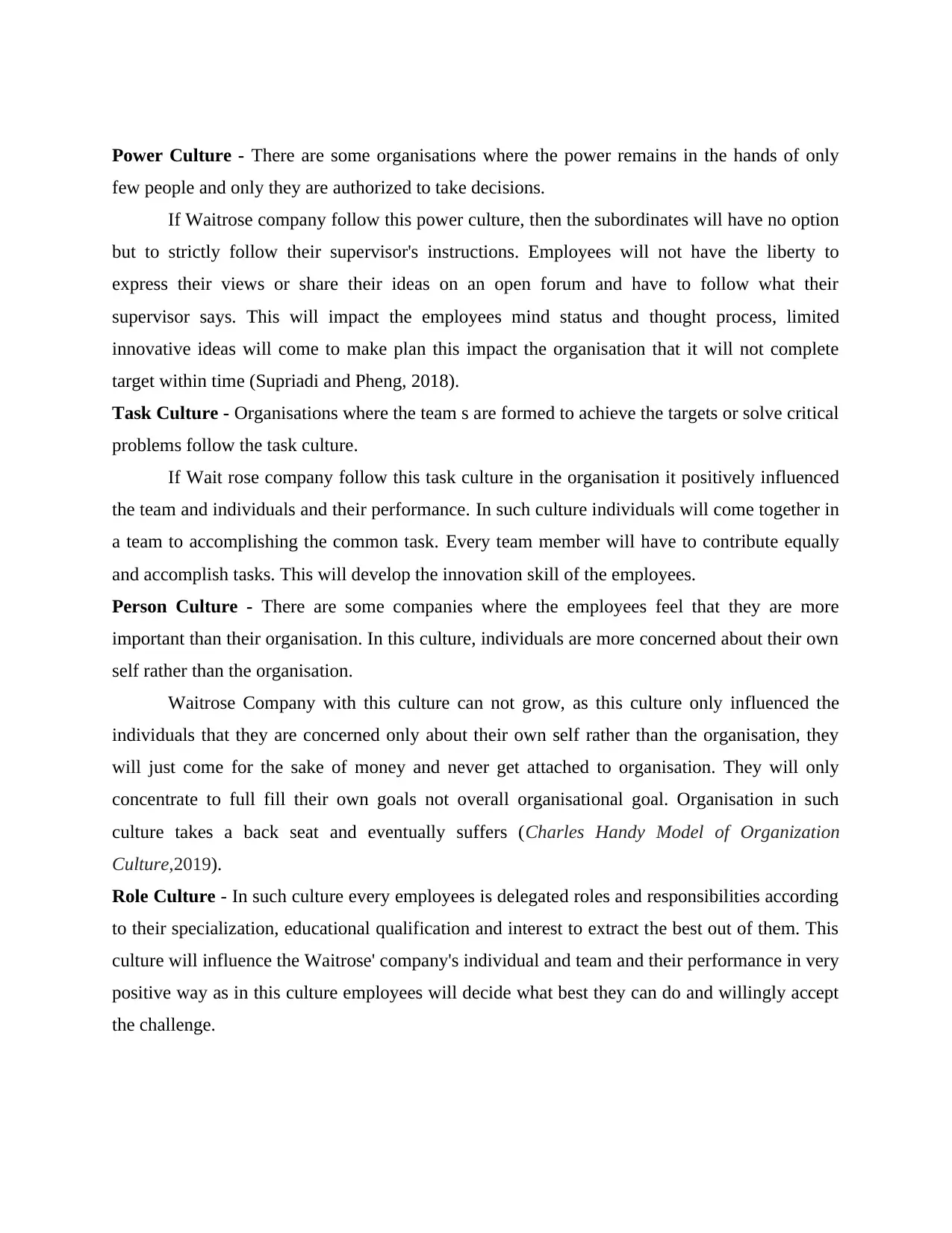
Power Culture - There are some organisations where the power remains in the hands of only
few people and only they are authorized to take decisions.
If Waitrose company follow this power culture, then the subordinates will have no option
but to strictly follow their supervisor's instructions. Employees will not have the liberty to
express their views or share their ideas on an open forum and have to follow what their
supervisor says. This will impact the employees mind status and thought process, limited
innovative ideas will come to make plan this impact the organisation that it will not complete
target within time (Supriadi and Pheng, 2018).
Task Culture - Organisations where the team s are formed to achieve the targets or solve critical
problems follow the task culture.
If Wait rose company follow this task culture in the organisation it positively influenced
the team and individuals and their performance. In such culture individuals will come together in
a team to accomplishing the common task. Every team member will have to contribute equally
and accomplish tasks. This will develop the innovation skill of the employees.
Person Culture - There are some companies where the employees feel that they are more
important than their organisation. In this culture, individuals are more concerned about their own
self rather than the organisation.
Waitrose Company with this culture can not grow, as this culture only influenced the
individuals that they are concerned only about their own self rather than the organisation, they
will just come for the sake of money and never get attached to organisation. They will only
concentrate to full fill their own goals not overall organisational goal. Organisation in such
culture takes a back seat and eventually suffers (Charles Handy Model of Organization
Culture,2019).
Role Culture - In such culture every employees is delegated roles and responsibilities according
to their specialization, educational qualification and interest to extract the best out of them. This
culture will influence the Waitrose' company's individual and team and their performance in very
positive way as in this culture employees will decide what best they can do and willingly accept
the challenge.
few people and only they are authorized to take decisions.
If Waitrose company follow this power culture, then the subordinates will have no option
but to strictly follow their supervisor's instructions. Employees will not have the liberty to
express their views or share their ideas on an open forum and have to follow what their
supervisor says. This will impact the employees mind status and thought process, limited
innovative ideas will come to make plan this impact the organisation that it will not complete
target within time (Supriadi and Pheng, 2018).
Task Culture - Organisations where the team s are formed to achieve the targets or solve critical
problems follow the task culture.
If Wait rose company follow this task culture in the organisation it positively influenced
the team and individuals and their performance. In such culture individuals will come together in
a team to accomplishing the common task. Every team member will have to contribute equally
and accomplish tasks. This will develop the innovation skill of the employees.
Person Culture - There are some companies where the employees feel that they are more
important than their organisation. In this culture, individuals are more concerned about their own
self rather than the organisation.
Waitrose Company with this culture can not grow, as this culture only influenced the
individuals that they are concerned only about their own self rather than the organisation, they
will just come for the sake of money and never get attached to organisation. They will only
concentrate to full fill their own goals not overall organisational goal. Organisation in such
culture takes a back seat and eventually suffers (Charles Handy Model of Organization
Culture,2019).
Role Culture - In such culture every employees is delegated roles and responsibilities according
to their specialization, educational qualification and interest to extract the best out of them. This
culture will influence the Waitrose' company's individual and team and their performance in very
positive way as in this culture employees will decide what best they can do and willingly accept
the challenge.
Paraphrase This Document
Need a fresh take? Get an instant paraphrase of this document with our AI Paraphraser
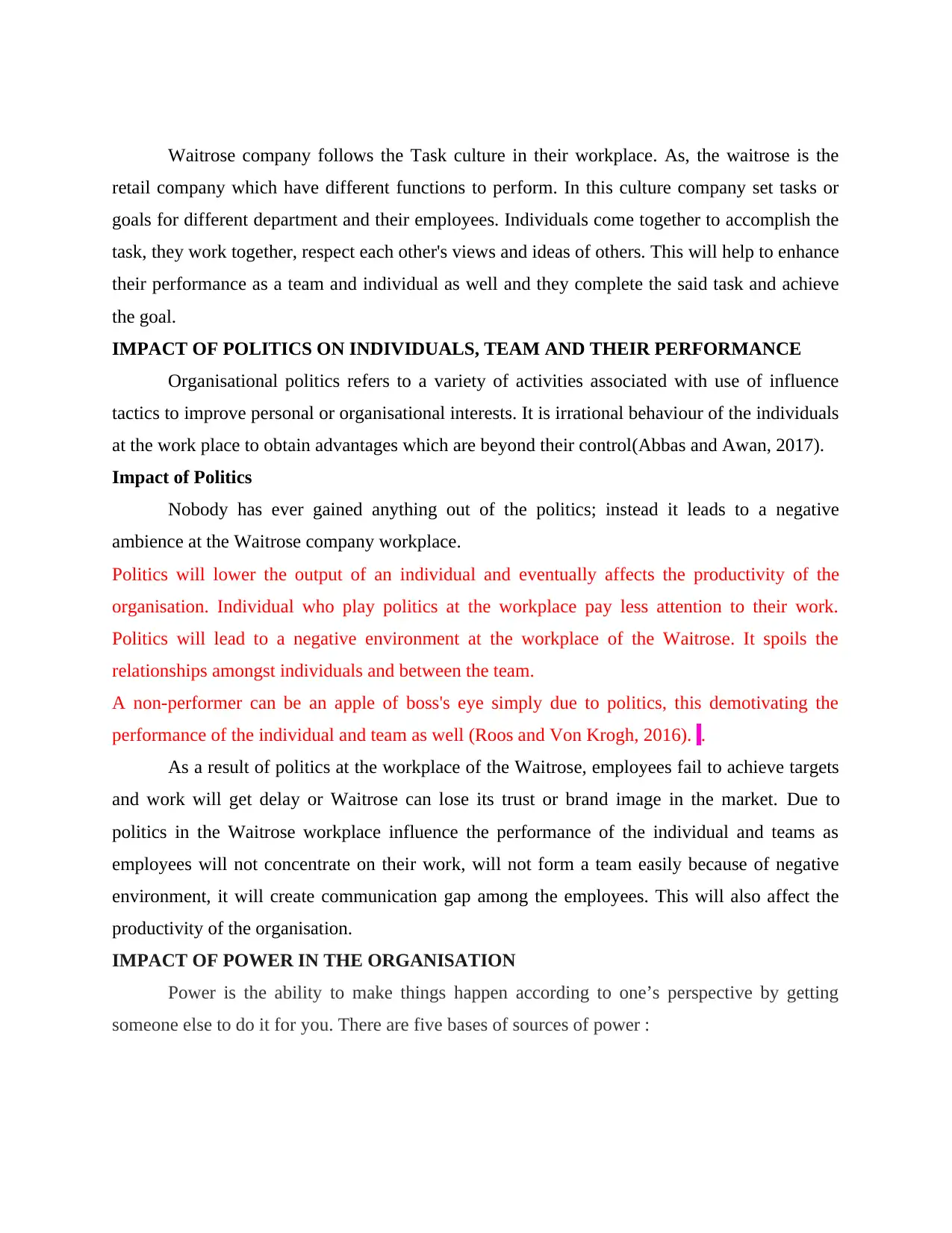
Waitrose company follows the Task culture in their workplace. As, the waitrose is the
retail company which have different functions to perform. In this culture company set tasks or
goals for different department and their employees. Individuals come together to accomplish the
task, they work together, respect each other's views and ideas of others. This will help to enhance
their performance as a team and individual as well and they complete the said task and achieve
the goal.
IMPACT OF POLITICS ON INDIVIDUALS, TEAM AND THEIR PERFORMANCE
Organisational politics refers to a variety of activities associated with use of influence
tactics to improve personal or organisational interests. It is irrational behaviour of the individuals
at the work place to obtain advantages which are beyond their control(Abbas and Awan, 2017).
Impact of Politics
Nobody has ever gained anything out of the politics; instead it leads to a negative
ambience at the Waitrose company workplace.
Politics will lower the output of an individual and eventually affects the productivity of the
organisation. Individual who play politics at the workplace pay less attention to their work.
Politics will lead to a negative environment at the workplace of the Waitrose. It spoils the
relationships amongst individuals and between the team.
A non-performer can be an apple of boss's eye simply due to politics, this demotivating the
performance of the individual and team as well (Roos and Von Krogh, 2016). .
As a result of politics at the workplace of the Waitrose, employees fail to achieve targets
and work will get delay or Waitrose can lose its trust or brand image in the market. Due to
politics in the Waitrose workplace influence the performance of the individual and teams as
employees will not concentrate on their work, will not form a team easily because of negative
environment, it will create communication gap among the employees. This will also affect the
productivity of the organisation.
IMPACT OF POWER IN THE ORGANISATION
Power is the ability to make things happen according to one’s perspective by getting
someone else to do it for you. There are five bases of sources of power :
retail company which have different functions to perform. In this culture company set tasks or
goals for different department and their employees. Individuals come together to accomplish the
task, they work together, respect each other's views and ideas of others. This will help to enhance
their performance as a team and individual as well and they complete the said task and achieve
the goal.
IMPACT OF POLITICS ON INDIVIDUALS, TEAM AND THEIR PERFORMANCE
Organisational politics refers to a variety of activities associated with use of influence
tactics to improve personal or organisational interests. It is irrational behaviour of the individuals
at the work place to obtain advantages which are beyond their control(Abbas and Awan, 2017).
Impact of Politics
Nobody has ever gained anything out of the politics; instead it leads to a negative
ambience at the Waitrose company workplace.
Politics will lower the output of an individual and eventually affects the productivity of the
organisation. Individual who play politics at the workplace pay less attention to their work.
Politics will lead to a negative environment at the workplace of the Waitrose. It spoils the
relationships amongst individuals and between the team.
A non-performer can be an apple of boss's eye simply due to politics, this demotivating the
performance of the individual and team as well (Roos and Von Krogh, 2016). .
As a result of politics at the workplace of the Waitrose, employees fail to achieve targets
and work will get delay or Waitrose can lose its trust or brand image in the market. Due to
politics in the Waitrose workplace influence the performance of the individual and teams as
employees will not concentrate on their work, will not form a team easily because of negative
environment, it will create communication gap among the employees. This will also affect the
productivity of the organisation.
IMPACT OF POWER IN THE ORGANISATION
Power is the ability to make things happen according to one’s perspective by getting
someone else to do it for you. There are five bases of sources of power :
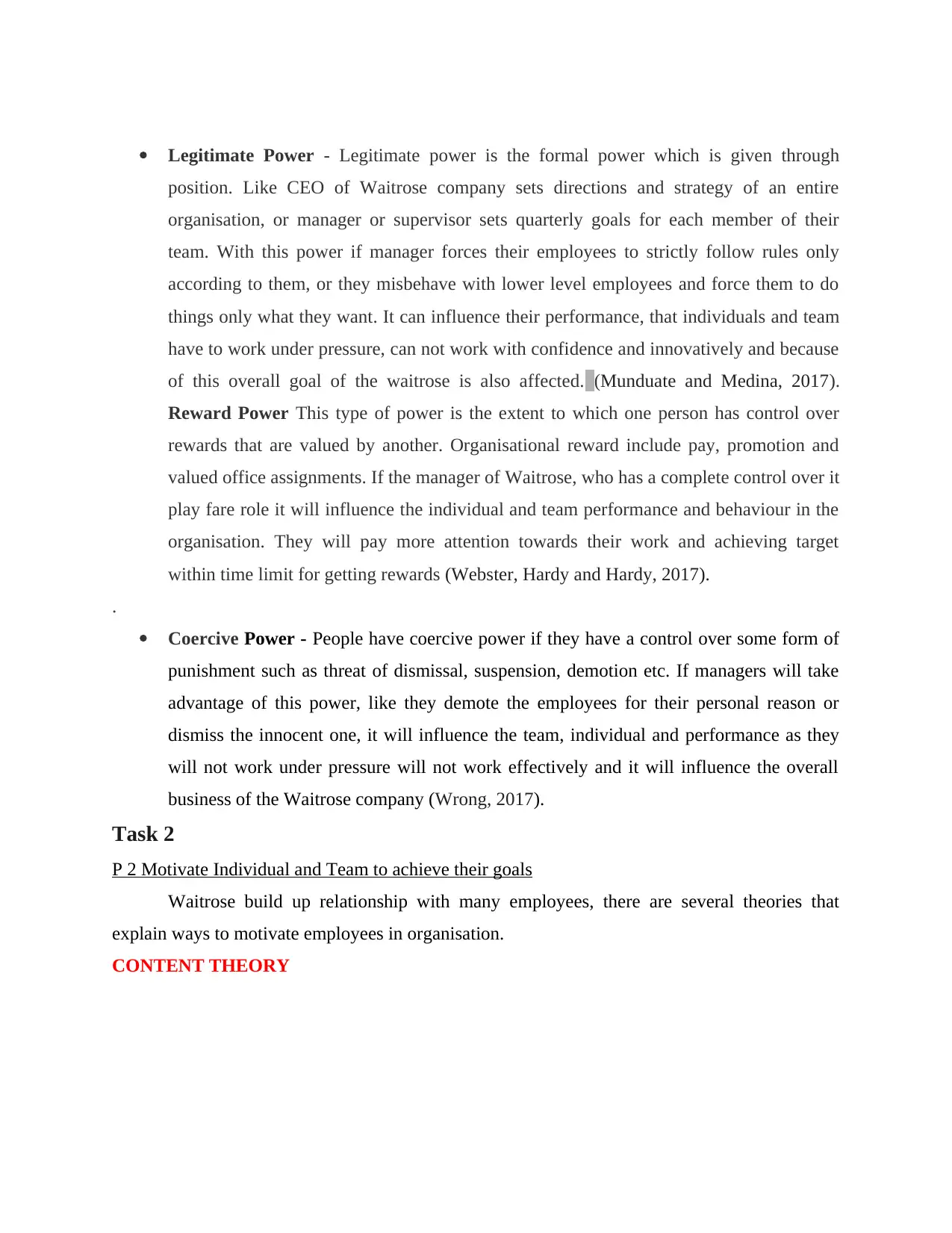
Legitimate Power - Legitimate power is the formal power which is given through
position. Like CEO of Waitrose company sets directions and strategy of an entire
organisation, or manager or supervisor sets quarterly goals for each member of their
team. With this power if manager forces their employees to strictly follow rules only
according to them, or they misbehave with lower level employees and force them to do
things only what they want. It can influence their performance, that individuals and team
have to work under pressure, can not work with confidence and innovatively and because
of this overall goal of the waitrose is also affected. (Munduate and Medina, 2017).
Reward Power This type of power is the extent to which one person has control over
rewards that are valued by another. Organisational reward include pay, promotion and
valued office assignments. If the manager of Waitrose, who has a complete control over it
play fare role it will influence the individual and team performance and behaviour in the
organisation. They will pay more attention towards their work and achieving target
within time limit for getting rewards (Webster, Hardy and Hardy, 2017).
.
Coercive Power - People have coercive power if they have a control over some form of
punishment such as threat of dismissal, suspension, demotion etc. If managers will take
advantage of this power, like they demote the employees for their personal reason or
dismiss the innocent one, it will influence the team, individual and performance as they
will not work under pressure will not work effectively and it will influence the overall
business of the Waitrose company (Wrong, 2017).
Task 2
P 2 Motivate Individual and Team to achieve their goals
Waitrose build up relationship with many employees, there are several theories that
explain ways to motivate employees in organisation.
CONTENT THEORY
position. Like CEO of Waitrose company sets directions and strategy of an entire
organisation, or manager or supervisor sets quarterly goals for each member of their
team. With this power if manager forces their employees to strictly follow rules only
according to them, or they misbehave with lower level employees and force them to do
things only what they want. It can influence their performance, that individuals and team
have to work under pressure, can not work with confidence and innovatively and because
of this overall goal of the waitrose is also affected. (Munduate and Medina, 2017).
Reward Power This type of power is the extent to which one person has control over
rewards that are valued by another. Organisational reward include pay, promotion and
valued office assignments. If the manager of Waitrose, who has a complete control over it
play fare role it will influence the individual and team performance and behaviour in the
organisation. They will pay more attention towards their work and achieving target
within time limit for getting rewards (Webster, Hardy and Hardy, 2017).
.
Coercive Power - People have coercive power if they have a control over some form of
punishment such as threat of dismissal, suspension, demotion etc. If managers will take
advantage of this power, like they demote the employees for their personal reason or
dismiss the innocent one, it will influence the team, individual and performance as they
will not work under pressure will not work effectively and it will influence the overall
business of the Waitrose company (Wrong, 2017).
Task 2
P 2 Motivate Individual and Team to achieve their goals
Waitrose build up relationship with many employees, there are several theories that
explain ways to motivate employees in organisation.
CONTENT THEORY
⊘ This is a preview!⊘
Do you want full access?
Subscribe today to unlock all pages.

Trusted by 1+ million students worldwide
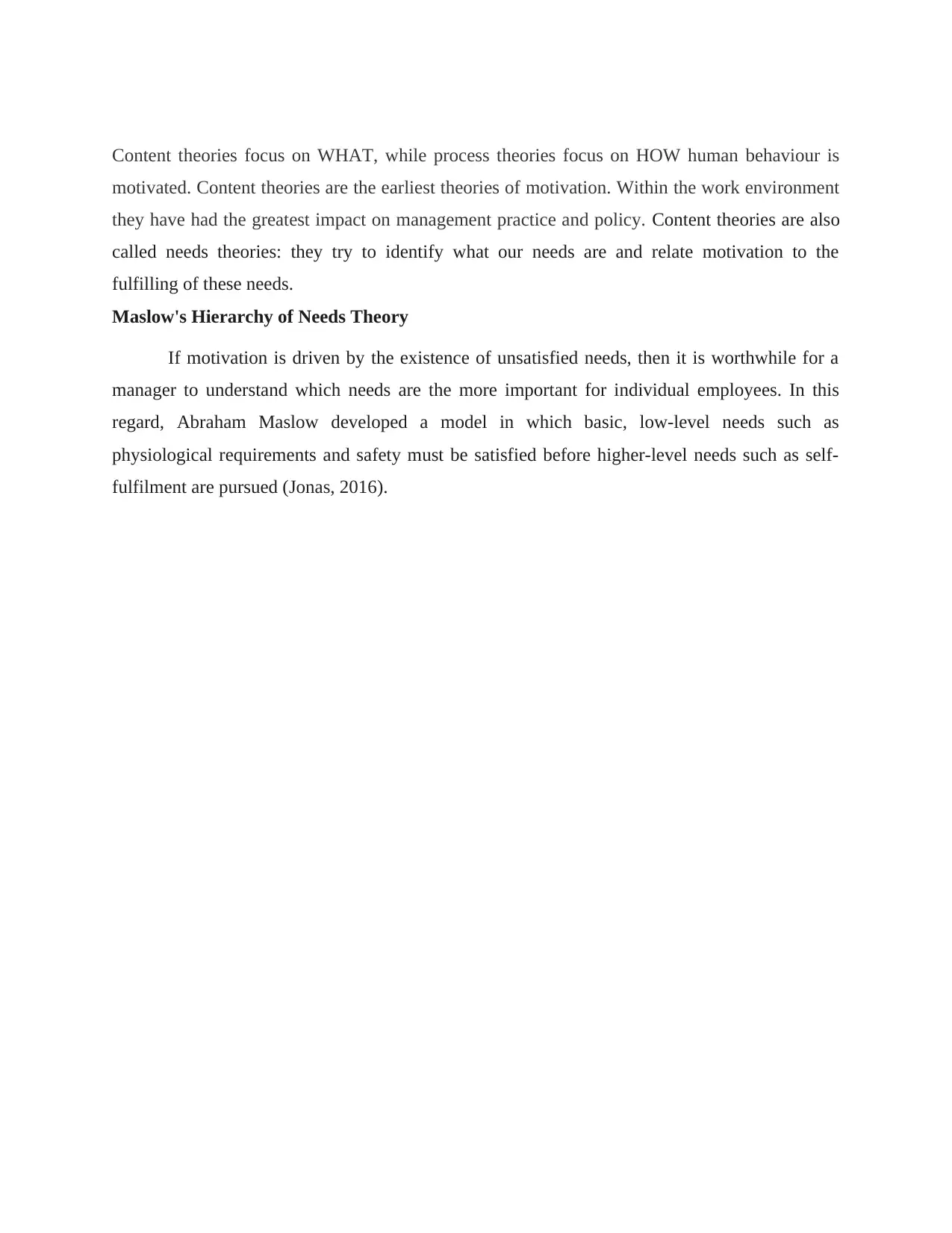
Content theories focus on WHAT, while process theories focus on HOW human behaviour is
motivated. Content theories are the earliest theories of motivation. Within the work environment
they have had the greatest impact on management practice and policy. Content theories are also
called needs theories: they try to identify what our needs are and relate motivation to the
fulfilling of these needs.
Maslow's Hierarchy of Needs Theory
If motivation is driven by the existence of unsatisfied needs, then it is worthwhile for a
manager to understand which needs are the more important for individual employees. In this
regard, Abraham Maslow developed a model in which basic, low-level needs such as
physiological requirements and safety must be satisfied before higher-level needs such as self-
fulfilment are pursued (Jonas, 2016).
motivated. Content theories are the earliest theories of motivation. Within the work environment
they have had the greatest impact on management practice and policy. Content theories are also
called needs theories: they try to identify what our needs are and relate motivation to the
fulfilling of these needs.
Maslow's Hierarchy of Needs Theory
If motivation is driven by the existence of unsatisfied needs, then it is worthwhile for a
manager to understand which needs are the more important for individual employees. In this
regard, Abraham Maslow developed a model in which basic, low-level needs such as
physiological requirements and safety must be satisfied before higher-level needs such as self-
fulfilment are pursued (Jonas, 2016).
Paraphrase This Document
Need a fresh take? Get an instant paraphrase of this document with our AI Paraphraser
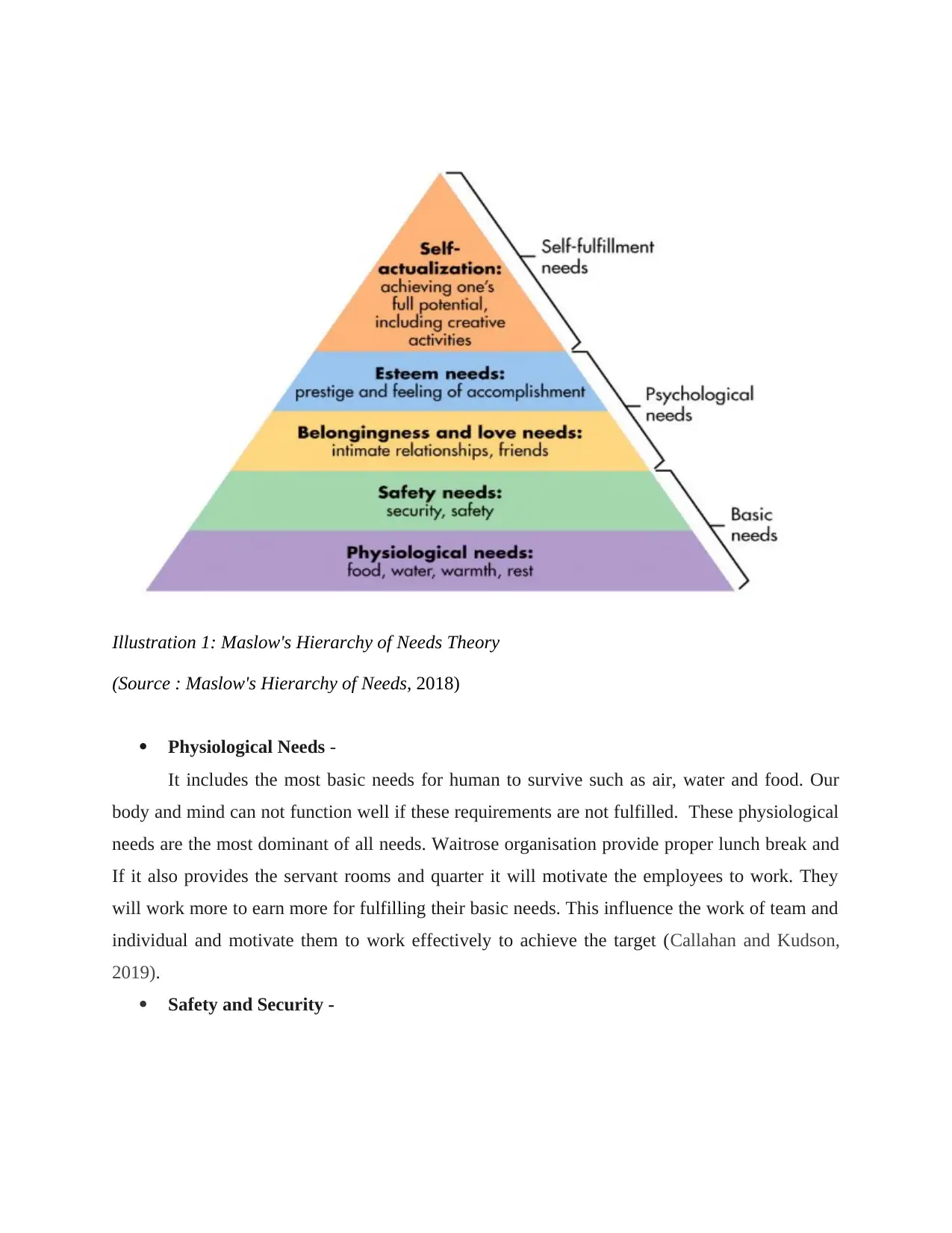
Illustration 1: Maslow's Hierarchy of Needs Theory
(Source : Maslow's Hierarchy of Needs, 2018)
Physiological Needs -
It includes the most basic needs for human to survive such as air, water and food. Our
body and mind can not function well if these requirements are not fulfilled. These physiological
needs are the most dominant of all needs. Waitrose organisation provide proper lunch break and
If it also provides the servant rooms and quarter it will motivate the employees to work. They
will work more to earn more for fulfilling their basic needs. This influence the work of team and
individual and motivate them to work effectively to achieve the target (Callahan and Kudson,
2019).
Safety and Security -
(Source : Maslow's Hierarchy of Needs, 2018)
Physiological Needs -
It includes the most basic needs for human to survive such as air, water and food. Our
body and mind can not function well if these requirements are not fulfilled. These physiological
needs are the most dominant of all needs. Waitrose organisation provide proper lunch break and
If it also provides the servant rooms and quarter it will motivate the employees to work. They
will work more to earn more for fulfilling their basic needs. This influence the work of team and
individual and motivate them to work effectively to achieve the target (Callahan and Kudson,
2019).
Safety and Security -
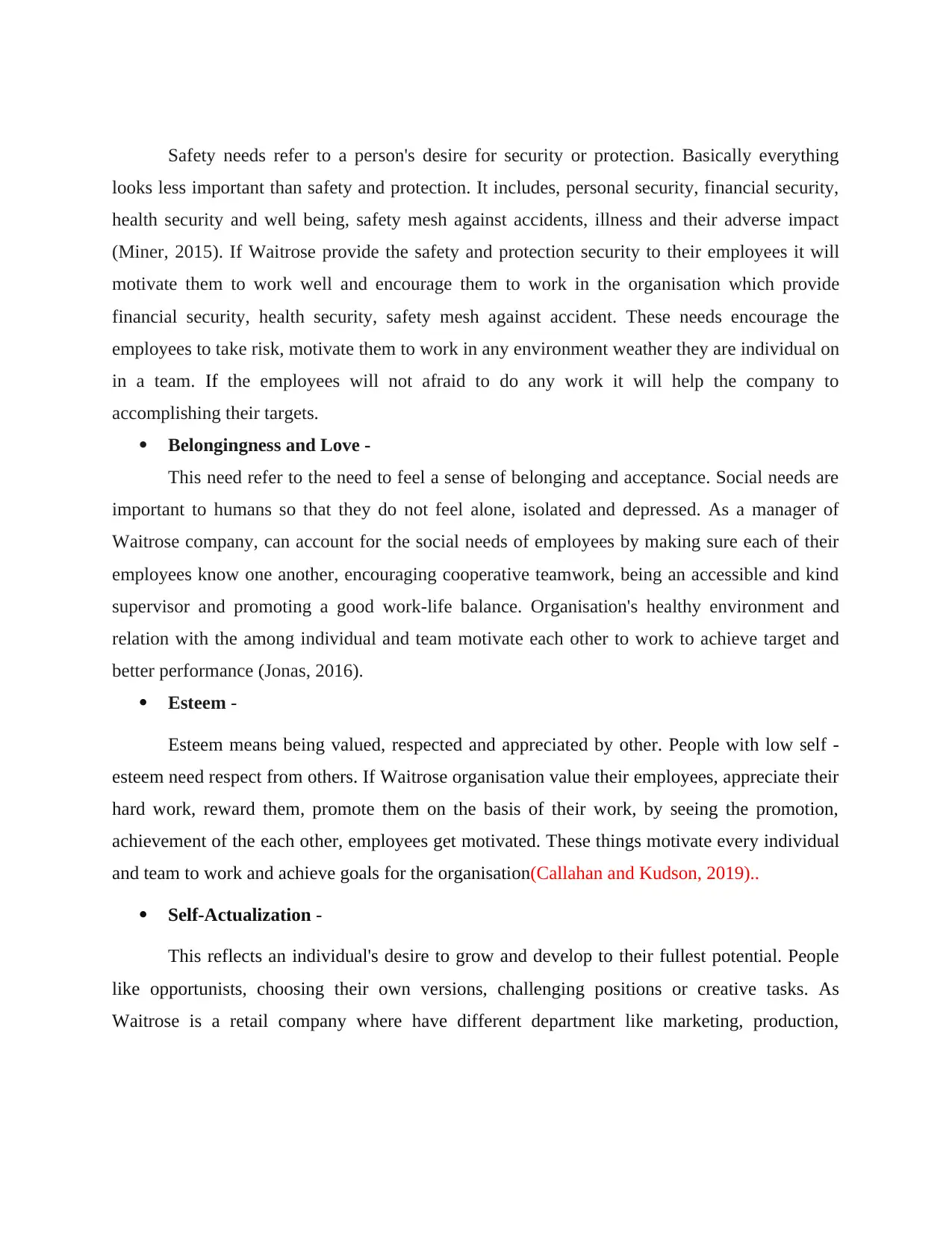
Safety needs refer to a person's desire for security or protection. Basically everything
looks less important than safety and protection. It includes, personal security, financial security,
health security and well being, safety mesh against accidents, illness and their adverse impact
(Miner, 2015). If Waitrose provide the safety and protection security to their employees it will
motivate them to work well and encourage them to work in the organisation which provide
financial security, health security, safety mesh against accident. These needs encourage the
employees to take risk, motivate them to work in any environment weather they are individual on
in a team. If the employees will not afraid to do any work it will help the company to
accomplishing their targets.
Belongingness and Love -
This need refer to the need to feel a sense of belonging and acceptance. Social needs are
important to humans so that they do not feel alone, isolated and depressed. As a manager of
Waitrose company, can account for the social needs of employees by making sure each of their
employees know one another, encouraging cooperative teamwork, being an accessible and kind
supervisor and promoting a good work-life balance. Organisation's healthy environment and
relation with the among individual and team motivate each other to work to achieve target and
better performance (Jonas, 2016).
Esteem -
Esteem means being valued, respected and appreciated by other. People with low self -
esteem need respect from others. If Waitrose organisation value their employees, appreciate their
hard work, reward them, promote them on the basis of their work, by seeing the promotion,
achievement of the each other, employees get motivated. These things motivate every individual
and team to work and achieve goals for the organisation(Callahan and Kudson, 2019)..
Self-Actualization -
This reflects an individual's desire to grow and develop to their fullest potential. People
like opportunists, choosing their own versions, challenging positions or creative tasks. As
Waitrose is a retail company where have different department like marketing, production,
looks less important than safety and protection. It includes, personal security, financial security,
health security and well being, safety mesh against accidents, illness and their adverse impact
(Miner, 2015). If Waitrose provide the safety and protection security to their employees it will
motivate them to work well and encourage them to work in the organisation which provide
financial security, health security, safety mesh against accident. These needs encourage the
employees to take risk, motivate them to work in any environment weather they are individual on
in a team. If the employees will not afraid to do any work it will help the company to
accomplishing their targets.
Belongingness and Love -
This need refer to the need to feel a sense of belonging and acceptance. Social needs are
important to humans so that they do not feel alone, isolated and depressed. As a manager of
Waitrose company, can account for the social needs of employees by making sure each of their
employees know one another, encouraging cooperative teamwork, being an accessible and kind
supervisor and promoting a good work-life balance. Organisation's healthy environment and
relation with the among individual and team motivate each other to work to achieve target and
better performance (Jonas, 2016).
Esteem -
Esteem means being valued, respected and appreciated by other. People with low self -
esteem need respect from others. If Waitrose organisation value their employees, appreciate their
hard work, reward them, promote them on the basis of their work, by seeing the promotion,
achievement of the each other, employees get motivated. These things motivate every individual
and team to work and achieve goals for the organisation(Callahan and Kudson, 2019)..
Self-Actualization -
This reflects an individual's desire to grow and develop to their fullest potential. People
like opportunists, choosing their own versions, challenging positions or creative tasks. As
Waitrose is a retail company where have different department like marketing, production,
⊘ This is a preview!⊘
Do you want full access?
Subscribe today to unlock all pages.

Trusted by 1+ million students worldwide
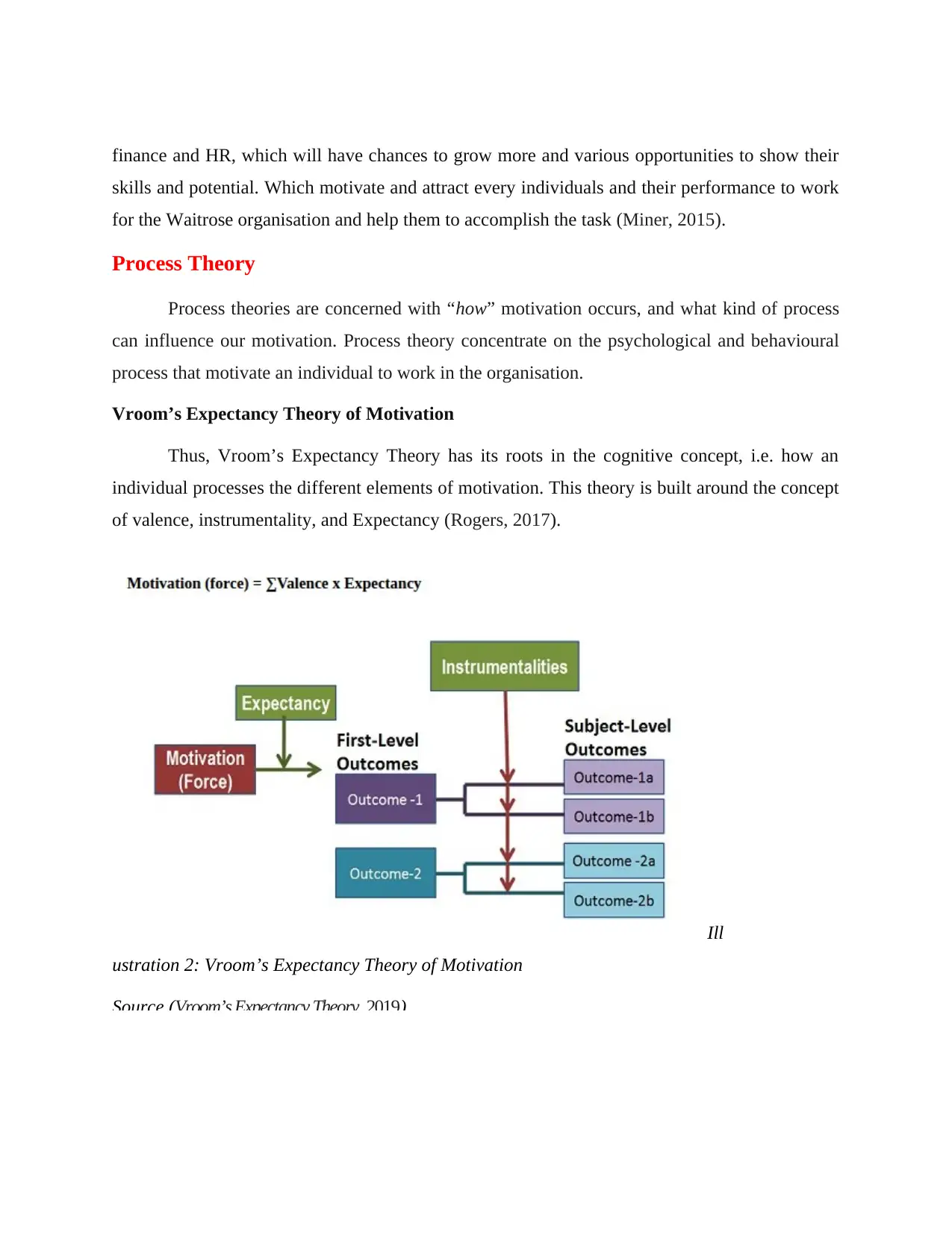
finance and HR, which will have chances to grow more and various opportunities to show their
skills and potential. Which motivate and attract every individuals and their performance to work
for the Waitrose organisation and help them to accomplish the task (Miner, 2015).
Process Theory
Process theories are concerned with “how” motivation occurs, and what kind of process
can influence our motivation. Process theory concentrate on the psychological and behavioural
process that motivate an individual to work in the organisation.
Vroom’s Expectancy Theory of Motivation
Thus, Vroom’s Expectancy Theory has its roots in the cognitive concept, i.e. how an
individual processes the different elements of motivation. This theory is built around the concept
of valence, instrumentality, and Expectancy (Rogers, 2017).
Ill
ustration 2: Vroom’s Expectancy Theory of Motivation
Source (Vroom’s Expectancy Theory, 2019)
skills and potential. Which motivate and attract every individuals and their performance to work
for the Waitrose organisation and help them to accomplish the task (Miner, 2015).
Process Theory
Process theories are concerned with “how” motivation occurs, and what kind of process
can influence our motivation. Process theory concentrate on the psychological and behavioural
process that motivate an individual to work in the organisation.
Vroom’s Expectancy Theory of Motivation
Thus, Vroom’s Expectancy Theory has its roots in the cognitive concept, i.e. how an
individual processes the different elements of motivation. This theory is built around the concept
of valence, instrumentality, and Expectancy (Rogers, 2017).
Ill
ustration 2: Vroom’s Expectancy Theory of Motivation
Source (Vroom’s Expectancy Theory, 2019)
Paraphrase This Document
Need a fresh take? Get an instant paraphrase of this document with our AI Paraphraser
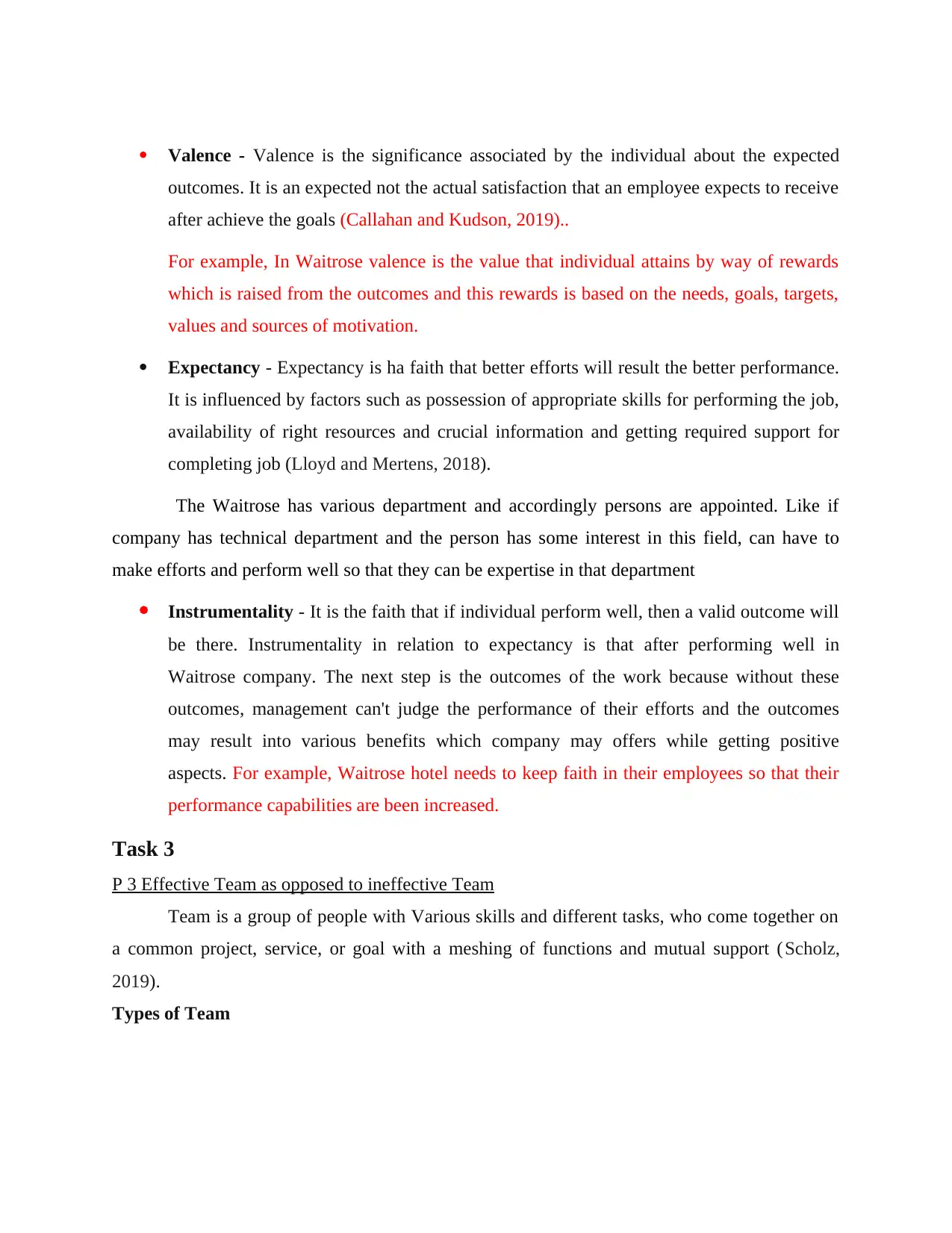
Valence - Valence is the significance associated by the individual about the expected
outcomes. It is an expected not the actual satisfaction that an employee expects to receive
after achieve the goals (Callahan and Kudson, 2019)..
For example, In Waitrose valence is the value that individual attains by way of rewards
which is raised from the outcomes and this rewards is based on the needs, goals, targets,
values and sources of motivation.
Expectancy - Expectancy is ha faith that better efforts will result the better performance.
It is influenced by factors such as possession of appropriate skills for performing the job,
availability of right resources and crucial information and getting required support for
completing job (Lloyd and Mertens, 2018).
The Waitrose has various department and accordingly persons are appointed. Like if
company has technical department and the person has some interest in this field, can have to
make efforts and perform well so that they can be expertise in that department
Instrumentality - It is the faith that if individual perform well, then a valid outcome will
be there. Instrumentality in relation to expectancy is that after performing well in
Waitrose company. The next step is the outcomes of the work because without these
outcomes, management can't judge the performance of their efforts and the outcomes
may result into various benefits which company may offers while getting positive
aspects. For example, Waitrose hotel needs to keep faith in their employees so that their
performance capabilities are been increased.
Task 3
P 3 Effective Team as opposed to ineffective Team
Team is a group of people with Various skills and different tasks, who come together on
a common project, service, or goal with a meshing of functions and mutual support (Scholz,
2019).
Types of Team
outcomes. It is an expected not the actual satisfaction that an employee expects to receive
after achieve the goals (Callahan and Kudson, 2019)..
For example, In Waitrose valence is the value that individual attains by way of rewards
which is raised from the outcomes and this rewards is based on the needs, goals, targets,
values and sources of motivation.
Expectancy - Expectancy is ha faith that better efforts will result the better performance.
It is influenced by factors such as possession of appropriate skills for performing the job,
availability of right resources and crucial information and getting required support for
completing job (Lloyd and Mertens, 2018).
The Waitrose has various department and accordingly persons are appointed. Like if
company has technical department and the person has some interest in this field, can have to
make efforts and perform well so that they can be expertise in that department
Instrumentality - It is the faith that if individual perform well, then a valid outcome will
be there. Instrumentality in relation to expectancy is that after performing well in
Waitrose company. The next step is the outcomes of the work because without these
outcomes, management can't judge the performance of their efforts and the outcomes
may result into various benefits which company may offers while getting positive
aspects. For example, Waitrose hotel needs to keep faith in their employees so that their
performance capabilities are been increased.
Task 3
P 3 Effective Team as opposed to ineffective Team
Team is a group of people with Various skills and different tasks, who come together on
a common project, service, or goal with a meshing of functions and mutual support (Scholz,
2019).
Types of Team
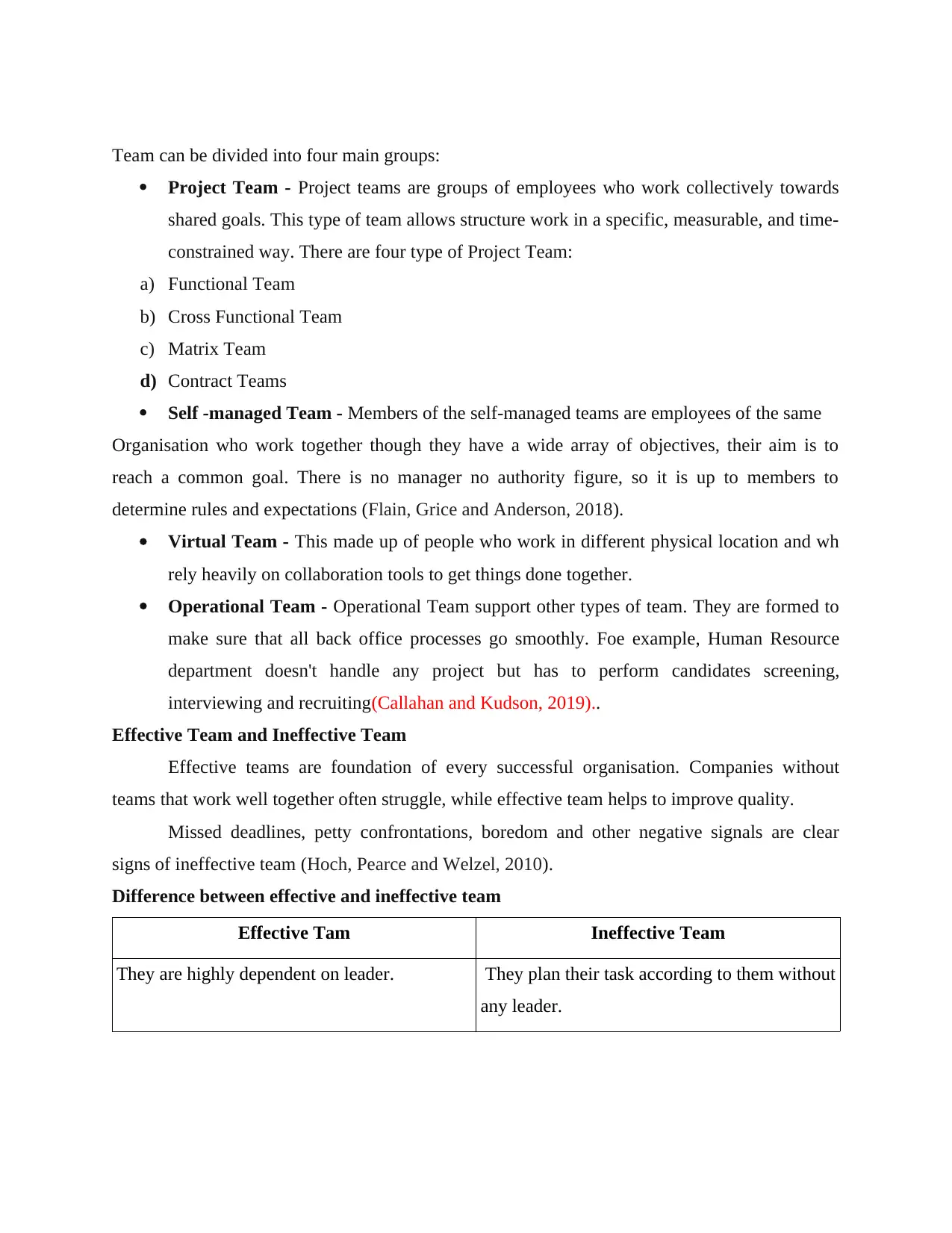
Team can be divided into four main groups:
Project Team - Project teams are groups of employees who work collectively towards
shared goals. This type of team allows structure work in a specific, measurable, and time-
constrained way. There are four type of Project Team:
a) Functional Team
b) Cross Functional Team
c) Matrix Team
d) Contract Teams
Self -managed Team - Members of the self-managed teams are employees of the same
Organisation who work together though they have a wide array of objectives, their aim is to
reach a common goal. There is no manager no authority figure, so it is up to members to
determine rules and expectations (Flain, Grice and Anderson, 2018).
Virtual Team - This made up of people who work in different physical location and wh
rely heavily on collaboration tools to get things done together.
Operational Team - Operational Team support other types of team. They are formed to
make sure that all back office processes go smoothly. Foe example, Human Resource
department doesn't handle any project but has to perform candidates screening,
interviewing and recruiting(Callahan and Kudson, 2019)..
Effective Team and Ineffective Team
Effective teams are foundation of every successful organisation. Companies without
teams that work well together often struggle, while effective team helps to improve quality.
Missed deadlines, petty confrontations, boredom and other negative signals are clear
signs of ineffective team (Hoch, Pearce and Welzel, 2010).
Difference between effective and ineffective team
Effective Tam Ineffective Team
They are highly dependent on leader. They plan their task according to them without
any leader.
Project Team - Project teams are groups of employees who work collectively towards
shared goals. This type of team allows structure work in a specific, measurable, and time-
constrained way. There are four type of Project Team:
a) Functional Team
b) Cross Functional Team
c) Matrix Team
d) Contract Teams
Self -managed Team - Members of the self-managed teams are employees of the same
Organisation who work together though they have a wide array of objectives, their aim is to
reach a common goal. There is no manager no authority figure, so it is up to members to
determine rules and expectations (Flain, Grice and Anderson, 2018).
Virtual Team - This made up of people who work in different physical location and wh
rely heavily on collaboration tools to get things done together.
Operational Team - Operational Team support other types of team. They are formed to
make sure that all back office processes go smoothly. Foe example, Human Resource
department doesn't handle any project but has to perform candidates screening,
interviewing and recruiting(Callahan and Kudson, 2019)..
Effective Team and Ineffective Team
Effective teams are foundation of every successful organisation. Companies without
teams that work well together often struggle, while effective team helps to improve quality.
Missed deadlines, petty confrontations, boredom and other negative signals are clear
signs of ineffective team (Hoch, Pearce and Welzel, 2010).
Difference between effective and ineffective team
Effective Tam Ineffective Team
They are highly dependent on leader. They plan their task according to them without
any leader.
⊘ This is a preview!⊘
Do you want full access?
Subscribe today to unlock all pages.

Trusted by 1+ million students worldwide
1 out of 20
Related Documents
Your All-in-One AI-Powered Toolkit for Academic Success.
+13062052269
info@desklib.com
Available 24*7 on WhatsApp / Email
![[object Object]](/_next/static/media/star-bottom.7253800d.svg)
Unlock your academic potential
Copyright © 2020–2025 A2Z Services. All Rights Reserved. Developed and managed by ZUCOL.





